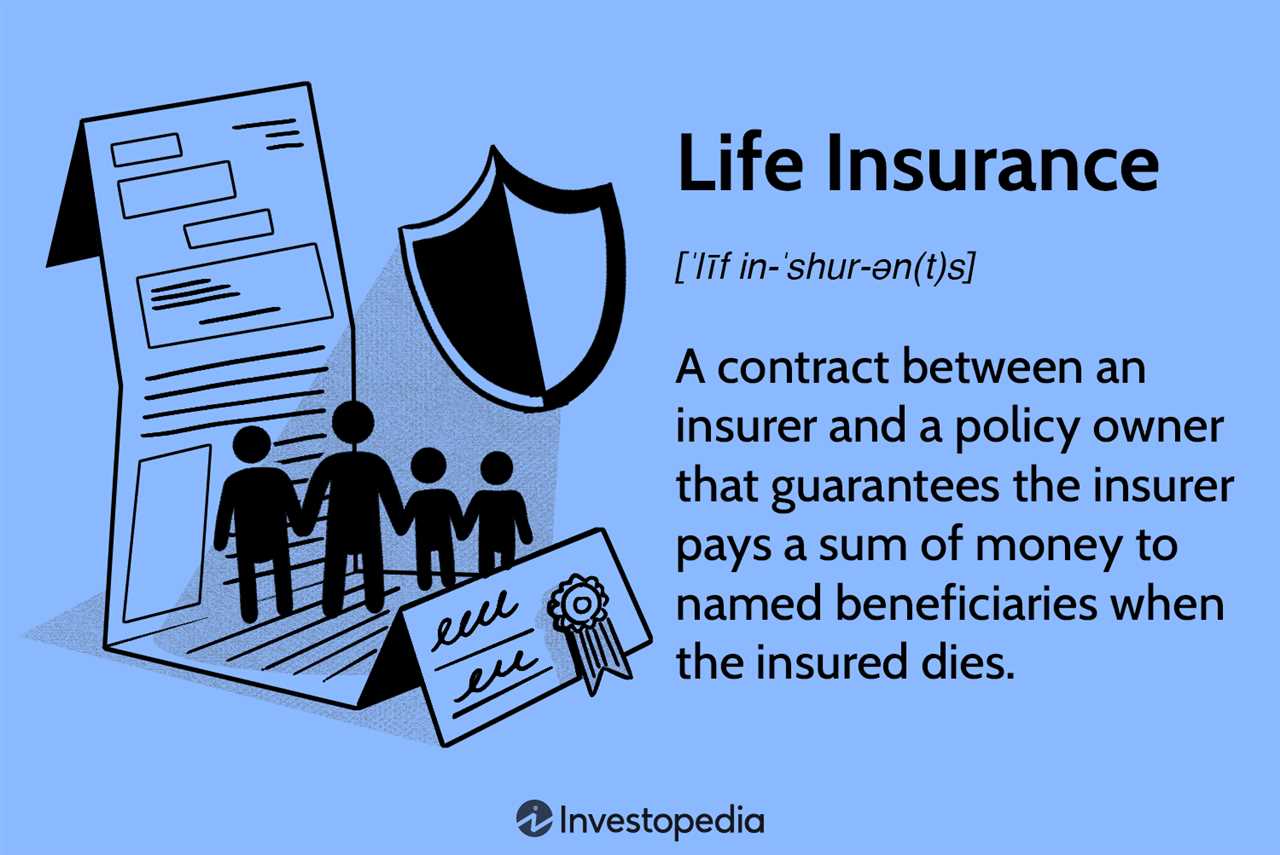Types of Life Insurance Policies
1. Term Life Insurance

Term life insurance provides coverage for a specific period of time, typically 10, 20, or 30 years. It offers a death benefit to your beneficiaries if you pass away during the term of the policy. Term life insurance is generally more affordable compared to other types of life insurance, making it a popular choice for individuals who want coverage for a specific period, such as until their mortgage is paid off or their children are financially independent.
2. Whole Life Insurance
Whole life insurance is a type of permanent life insurance that provides coverage for your entire lifetime. It offers a death benefit to your beneficiaries and also has a cash value component that grows over time. Whole life insurance premiums are typically higher than term life insurance premiums, but the policy builds cash value that you can borrow against or use for other financial needs.
3. Universal Life Insurance

Universal life insurance is another type of permanent life insurance that offers flexibility in terms of premium payments and death benefit. It allows you to adjust the amount of coverage and premium payments over time to meet your changing needs. Universal life insurance also has a cash value component that can grow over time and be used for various purposes.
4. Variable Life Insurance
Variable life insurance is a type of permanent life insurance that allows you to invest a portion of your premiums into various investment options, such as stocks, bonds, and mutual funds. The cash value of the policy fluctuates based on the performance of the underlying investments. Variable life insurance offers the potential for higher returns but also comes with higher risks compared to other types of life insurance.
Purchasing Life Insurance

1. Determine Your Coverage Needs
Before purchasing life insurance, it’s essential to assess your coverage needs. Consider factors such as your financial obligations, future expenses, and the needs of your dependents. This will help you determine the amount of coverage you require.
2. Research Different Providers
3. Understand Policy Options
There are various types of life insurance policies available, including term life insurance and whole life insurance. Take the time to understand the differences between these options and choose the one that best suits your needs and financial goals.
4. Get Multiple Quotes
Obtain quotes from multiple life insurance providers to compare prices and coverage options. This will help you find the most competitive rates and ensure you get the best value for your money.
5. Consult with an Insurance Agent
If you’re unsure about the best life insurance policy for you, consider consulting with an insurance agent. They can provide expert advice and help you navigate the complexities of life insurance.
By following these steps, you can make an informed decision when purchasing life insurance and ensure that you have the right coverage to protect yourself and your loved ones.
Assessing Your Needs
- Income replacement: Consider how much income your family would need to maintain their current lifestyle if you were no longer around. Life insurance can provide a financial safety net to replace lost income.
- Dependents: Evaluate the number and ages of your dependents. If you have young children or family members who rely on your income, you may need a higher coverage amount.
- Health conditions: Your health condition can impact the cost and availability of life insurance. Be prepared to provide information about your medical history and any pre-existing conditions.
- Future goals: Consider your future goals, such as retirement plans or funding your children’s education. Life insurance can help ensure these goals are still achievable even if you’re no longer there to provide for your family.
By carefully assessing your needs, you can make an informed decision about the type and amount of life insurance coverage that best suits your situation. Remember to review your policy periodically to ensure it continues to meet your evolving needs.
Comparing Different Providers
1. Financial Stability
One of the most important factors to consider is the financial stability of the insurance provider. You want to choose a company that has a strong financial rating and a history of paying out claims. Look for providers that are rated highly by independent rating agencies such as A.M. Best, Moody’s, or Standard & Poor’s.
2. Policy Options
Another important factor to consider is the range of policy options offered by the provider. Different providers may offer different types of life insurance policies, such as term life insurance, whole life insurance, or universal life insurance. Consider your specific needs and goals to determine which type of policy is best for you.
3. Premiums and Benefits
Compare the premiums and benefits offered by different providers. Look for providers that offer competitive premiums for the coverage you need. Additionally, consider the benefits included in the policy, such as riders or additional coverage options. These can vary between providers and may impact the overall value of the policy.
4. Customer Service and Reputation
Consider the customer service and reputation of the insurance provider. Look for providers that have a reputation for excellent customer service and a track record of handling claims efficiently. Reading customer reviews and testimonials can provide valuable insights into the provider’s reputation.
5. Additional Services
Some insurance providers may offer additional services or benefits that can enhance the value of your policy. These may include access to financial planning resources, online account management, or discounts on other insurance products. Consider these additional services when comparing providers.
By carefully comparing different providers based on these factors, you can make an informed decision and choose the life insurance policy that best meets your needs and goals.

Emily Bibb simplifies finance through bestselling books and articles, bridging complex concepts for everyday understanding. Engaging audiences via social media, she shares insights for financial success. Active in seminars and philanthropy, Bibb aims to create a more financially informed society, driven by her passion for empowering others.
